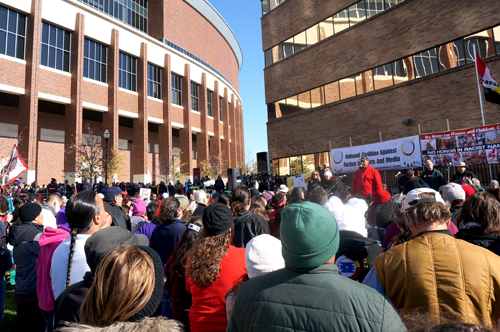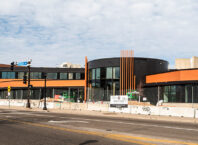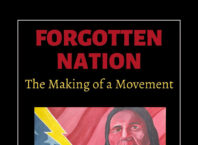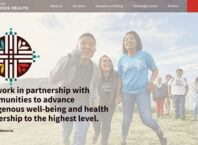 In the weeks since thousands of native
In the weeks since thousands of native
people and their allies converged on TCF Stadium to protest the
Washington NFL team’s offensive name, those involved in the
#NotYourMascot march and rally have continued the conversation with a
focus on maintaining momentum toward a name change.
“Five hundred and twenty-two years
of stereotypes is difficult to eradicate,” Robert DesJarlait, a Red
Lake elder, said. He carried the eagle staff to lead the People’s
March from the American Indian OIC to the stadium on the University
of Minnesota campus on Nov. 2 as an organizer for Save Our Manoomin.
“We need to use education as a means of dislodging decades of
stereotypes. [Washington owner Daniel] Snyder’s team is just the
starting point. But it’s the beginning of the process to eradicate
such imagery and restore pride and human dignity to Native people.”
Organizers of the march said while the
Washington team name is the most racially offensive, their battle to
end the use of native mascots in sport does not end there.
“We need to go after not just the
NFL, but the NHL and major-league baseball also,” Jason Elias, a
march organizer and member of AIM-Twin Cities said. “I think it’s
too bad we missed an opportunity this last summer to protest the
All-Star game when it was here in Minneapolis. One thing I would like
to say is that I would like to give credit and thank Vernon
Bellecourt who is the founding father in the fight against Native
mascots. He truly deserves the credit.”
Elias plans to continue the battle by
focusing on schools and using anti-bullying policies to target those
who wear native mascot gear to school.
#NotYourMascot is a coalition of
grassroots organizations including Idle No More-Twin Cities, AIM-Twin
Cities, AIM Patrol of Minneapolis, United Urban Warrior Society, Idle
No More-Wisconsin, Protect Our Manoomin, Twin Cities Save the Kids,
Minnesota Two Spirit Society and several other organizations.
The march and rally for the
Minnesota-Washington football game, which drew a crowd of between
3,500 and 5,000 people from across North America who marched on the
stadium from several directions, was the largest so far to protest
the use of native mascots by sports teams. Organizers vowed to
protest at each of the remaining Washington football games this
season. On Nov. 23, hundreds of protesters took to the streets in San
Francisco before the San Francisco-Washington game.
Opposition to the Washington team name
includes numerous tribal organizations and tribal leaders, the
National Congress of American Indians, the U.S. Congress, President
Barack Obama, civil rights and religious groups, players and former
players. Representatives of most of these groups spoke at the
Minneapolis rally.
“I think the thing that struck me
the most while I was marching was the notion that this was, in
essence, a civil rights march,” DesJarlait said. “We were
marching against discrimination, in particular, discriminatory
imagery that is not only evoked by Dan Snyder, but discriminatory
imagery that is embedded in the history between Euro-Americans and
Native Americans … One approach to maintain pressure on Dan Snyder
is to establish a nationwide alliance – an alliance that is
inclusive of all the various anti-mascot organizations and also
include non-Native groups. If more emphasis is placed on civil
rights, public support would broaden. At present, Snyder doesn’t
accept that his team’s name is racist. But the dynamics of civil
rights would force the issue of the racism that is inherent in the
team’s name.”
Yvonne Barrett, Lac Courte Oreilles
Ojibwe and her daughter, Mika, joined the march that began at
Northrup Auditorium. She was struck by the number of fans entering
the game who pushed back at the protest.
stadium, the group walked past several football fans – both for
Minnesota and Washington. I overheard one Vikings fan say to a rally
participant, ‘I don’t know what you guys are making a big deal
about. They’ve had the mascot for years. It’s tradition.’
Obviously, he has a different frame of reference for what tradition
means,” she said. “The rally made my daughter and I feel a lot of
pride for being part of a community that doesn’t tolerate racist
stereotypes in sports media and is speaking up.”
Jase Roe, who helped organize the
rally and march for the Minnesota Two Spirit Society, said racist
mascots are a symptom of a deeper issue. “I grew up being ashamed
of who I was,” he told the crowd gathered at American Indian OIC
before the two and a half-mile march. “For many of us today, it’s
more than a mascot or a name. It’s about taking pride in who we
are.”
After the rally, Barrett called on
leaders who spoke that day to continue the fight.
Speakers at the rally included leaders
of many native nations from Minnesota and elsewhere, members of
Congress, former NFL players, the mayor of Minneapolis and
representatives of national groups such as the National Coalition
Against Racism in Sports and Media.
“The march definitely brought the
community together. I saw so many individuals, families and community
organizations come together to have a united voice about the mascot
issue,” Barrett said. “I hope that the enthusiasm and spirit of
the day doesn’t end with the rally. We need to have the leaders
that were present continue to push the issue forward.”
Art Coulson, Cherokee Nation of
Oklahoma, is a veteran journalist and author who lives in the Twin
Cities.
PHOTO: Two rallies converged on TCF Stadium on Nov. 2 to protest the Washington NFL team’s mascot. Former Minnesota Vikings player Joey Browner addressed the crowd to speak about his Native roots and his objection to the mascot. (Photo by Alfred Walking Bull)
EDITOR’S NOTE: The National
Coalition Against Racism in Sports and Media organized the rally that
began at TCF Stadium. The #NotYourMascot march was organized by a
coalition of grassroots organizations not formally affiliated with
NCARSM.






